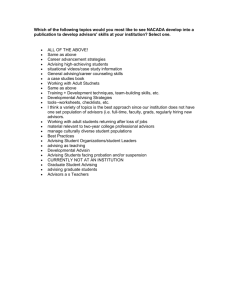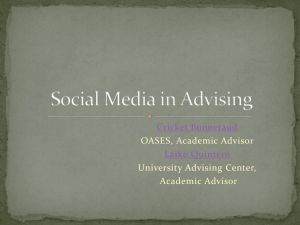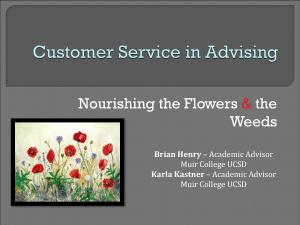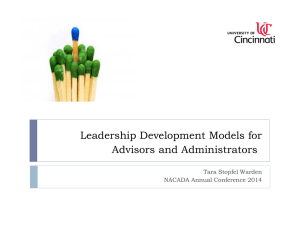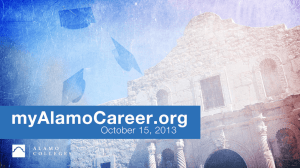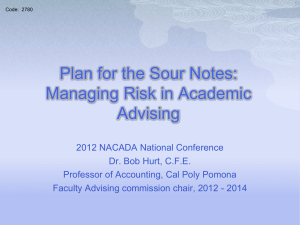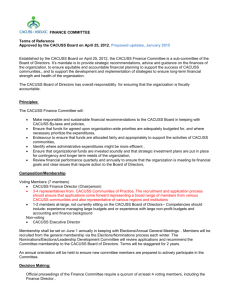New CACUSS Community Application OAAP
advertisement
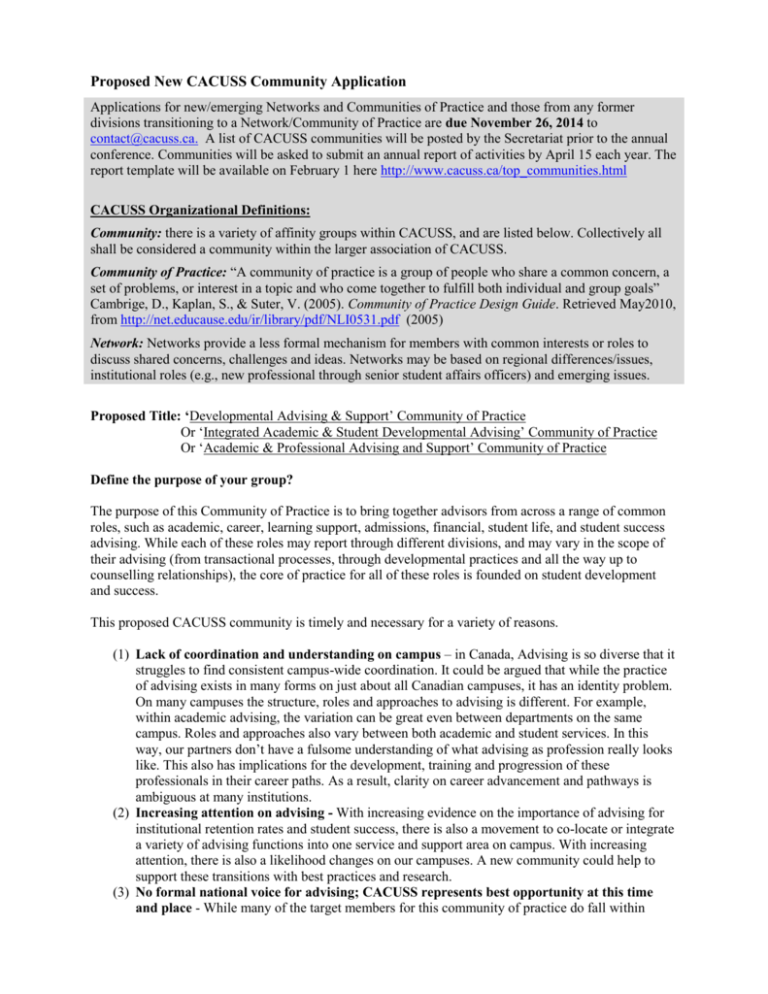
Proposed New CACUSS Community Application Applications for new/emerging Networks and Communities of Practice and those from any former divisions transitioning to a Network/Community of Practice are due November 26, 2014 to contact@cacuss.ca. A list of CACUSS communities will be posted by the Secretariat prior to the annual conference. Communities will be asked to submit an annual report of activities by April 15 each year. The report template will be available on February 1 here http://www.cacuss.ca/top_communities.html CACUSS Organizational Definitions: Community: there is a variety of affinity groups within CACUSS, and are listed below. Collectively all shall be considered a community within the larger association of CACUSS. Community of Practice: “A community of practice is a group of people who share a common concern, a set of problems, or interest in a topic and who come together to fulfill both individual and group goals” Cambrige, D., Kaplan, S., & Suter, V. (2005). Community of Practice Design Guide. Retrieved May2010, from http://net.educause.edu/ir/library/pdf/NLI0531.pdf (2005) Network: Networks provide a less formal mechanism for members with common interests or roles to discuss shared concerns, challenges and ideas. Networks may be based on regional differences/issues, institutional roles (e.g., new professional through senior student affairs officers) and emerging issues. Proposed Title: ‘Developmental Advising & Support’ Community of Practice Or ‘Integrated Academic & Student Developmental Advising’ Community of Practice Or ‘Academic & Professional Advising and Support’ Community of Practice Define the purpose of your group? The purpose of this Community of Practice is to bring together advisors from across a range of common roles, such as academic, career, learning support, admissions, financial, student life, and student success advising. While each of these roles may report through different divisions, and may vary in the scope of their advising (from transactional processes, through developmental practices and all the way up to counselling relationships), the core of practice for all of these roles is founded on student development and success. This proposed CACUSS community is timely and necessary for a variety of reasons. (1) Lack of coordination and understanding on campus – in Canada, Advising is so diverse that it struggles to find consistent campus-wide coordination. It could be argued that while the practice of advising exists in many forms on just about all Canadian campuses, it has an identity problem. On many campuses the structure, roles and approaches to advising is different. For example, within academic advising, the variation can be great even between departments on the same campus. Roles and approaches also vary between both academic and student services. In this way, our partners don’t have a fulsome understanding of what advising as profession really looks like. This also has implications for the development, training and progression of these professionals in their career paths. As a result, clarity on career advancement and pathways is ambiguous at many institutions. (2) Increasing attention on advising - With increasing evidence on the importance of advising for institutional retention rates and student success, there is also a movement to co-locate or integrate a variety of advising functions into one service and support area on campus. With increasing attention, there is also a likelihood changes on our campuses. A new community could help to support these transitions with best practices and research. (3) No formal national voice for advising; CACUSS represents best opportunity at this time and place - While many of the target members for this community of practice do fall within Student Affairs and Services on many campuses, they are not well represented in Canada, and not currently represented through CACUSS. Equally as many advisors also work directly within an Academic department, but again, there is no national voice for faculty or staff advisors. As such, this represents an opportunity to enrich the CACUSS community with a diverse group of advisors. This will also serve the target members with new networking and professional development opportunities that otherwise does not exist. (4) Very little Canadian information, research and literature about advising - It has also been noted that there is very little Canadian content available in literature and research across Canada. Making assessment, evaluation and research available across the country appears to be a core objective of this community and would support the previously stated objectives. (5) Advisors are the natural bridge between Academic and Student Affairs - Academic and Professional Advisors often serve as the most natural bridge between Student Affairs and Academic departments. Since academic collaborations are a core objective within Student Affairs, this would be a strategic addition to CACUSS, and a core focus for this community. It should be noted that the Ontario Academic Advising Professionals (OAAP) define academic advising in a way that is consistent with the objective this proposed CACUSS community: “Academic Advising is to be understood in its broadest sense and may include those involved in providing academic advice, career advice, counseling, liaison services, and/or learning skills opportunities in order to promote student success and retention (http://oaap.ca/terms-of-reference/). However, the basis of the ‘identity problem’ introduced above is more related to the fact that most higher education professionals do not recognize advising in this way. Who is your target member? Advising professionals in Canada: a) Who work in a variety of departments: admissions, academic, career, student life, transfer, pathways, learning support, student success, financial, registrar’s office, etc. b) Who serve different roles: Both faculty advisors and professional (Student Affairs) advisors and administrators. c) And who potentially have memberships in a variety of organizations: NACADA, AACUSS, Ontario Academic Advising Professionals, CACEE, etc. What are your primary activities? (Select all that apply from drop-down list) YES - Creating knowledge of benefit to the practice of your particular community (COP) YES - Sharing knowledge relevant for your particular community (Network) YES - Supporting professional networking and connections (COP/Network) YES - Fostering and promoting relevant research (COP) Designing and deliver programs and resources that promote the professional and personal development of our members (COP) Identifying issues that require advocacy (COP/Networks) Work related to advocating on behalf of a particular community or CACUSS as a whole (COP) YES - Identifying trends and key initiatives that could become new organizational priorities (COP) YES - Have membership support to meeting regularly, keep minutes and track activities (COP) YES - Support the core CACUSS mission through their annual activities (COP/Network) Primary focus is to organize networking opportunities regionally (Network) Primary focus is to organize networking opportunities nationally (Network) YES - Host a webinar (COP) YES - Only engage in a digital community (list serve, etc.) (Network) Meet semi-regularly (COP) Primary and Secondary Contact Info Tim Fricker, Director, Student Success Initiatives, Mohawk College Heather Doyle, Director, Student Support Services, Dalhousie University & Chair of Canada Interest Group, NACADA Loretta Gilbert, Co-op Coordinator, Seneca College & Chair, Ontario Academic Advising Professionals (OAAP) Shoshana Kalfon, Academic Counsellor, Concordia University & Liaison for NACADA Region #1 Karen Morse, Academic Pathways to Success Facilitator, UPEI Darran Fernandez, Associate Director, Student Support & Advising, UBC *Also unanimous support from an OAAP Steering Committee and a group of 25 members who participated in a focus group (Conversation Café) at the annual conference on November 20, 2014. **Each of the individuals listed above supports this application for a new CACUSS community of practice. What are the opportunities to contribute within the community? Since this is a new community, identifying the actual primary activities (from the drop down list above) is not possible yet. The work in the first year or two of the community will define the purpose and objectives of the community with more clarity. Since there are already some established regular conferences and events where advisors meet (i.e. OAAP, ONCAT Pathways, NACADA annual and regional conferences, AACUSS committees and conferences), sharing information about this community with attendees will be an important way to engage new and potential members. The Centre for Higher Education Research and Development (CHERD) at the University of Manitoba also just launched new PD opportunities for academic advisors. Any new member will have the opportunity to contribute in any ways that may support the achievement of year one objectives states below. Suggestions from the CACUSS board are also welcome. What are your 1-3 objectives for this year (December 14-May 15)? List any ideas you have for next year (June 15-June 16). 14-15 1. Formation of community of practice; establish leadership roles. 2. Create communication and awareness plan, including e-mails and attendance at up-coming association meetings and the annual CACUSS conference. 3. Discuss potential for unique programming at annual Conference - pre-conference workshops, advising specific sessions, and advisor networking to discuss the COP. 4. Survey all potential members to inform basic environmental scan and assess preliminary value of the community for potential members; gain an understanding of advising from a Canadian perspective; report on the environmental scan and next steps/objectives for 15-16. 15-16 1. Continuation of year one work. 2. Focus on any key issues pertinent to advising in the Canadian context and planning around the objectives derived from feedback survey.

